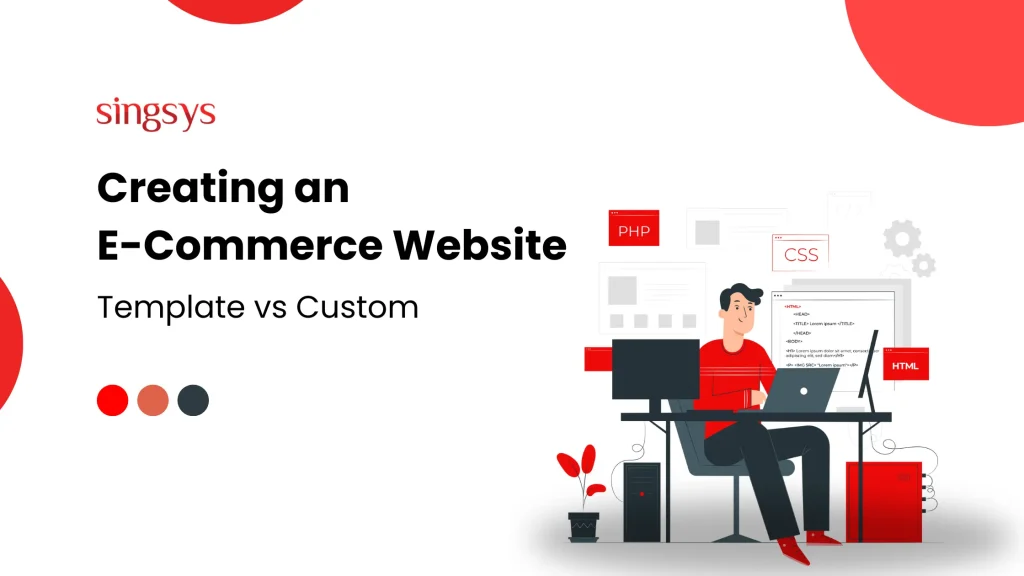In today’s digital age, an online presence is vital for businesses to reach a global audience and thrive in the competitive market. For retailers, establishing an e-commerce website is not just an option but a necessity. When embarking on the journey of creating an e-commerce website, one of the first decisions to make is whether to opt for a pre-designed template or invest in custom development.
This article will explore the advantages and disadvantages of both approaches, providing valuable insights to help businesses make an informed decision on which path to take for their e-commerce venture.
E-commerce Template
What is an E-Commerce Template?
E-commerce templates are pre-designed website layouts specifically tailored for online stores. They come with a ready-made structure, design elements, and functionalities, allowing businesses to quickly set up an e-commerce website without the need for extensive coding.
The Convenience of E-Commerce Templates
1. Quick Deployment: Templates offer a speedy setup process, reducing the time it takes to launch the e-commerce website and start selling products online.
2. Cost-Effectiveness: Compared to custom development, e-commerce templates are more budget-friendly, making them an attractive option for small businesses or startups with limitThe Constraints of E-Commerce Templates.
3. User-Friendly: Templates are designed with user experience in mind, ensuring an intuitive navigation system and appealing design that can attract customers.
The Constraints of E-Commerce Templates
1. Limited Customization: While templates offer convenience, they come with limitations in terms of customization. Businesses might find it challenging to achieve a unique and distinctive brand identity with a template that is used by numerous other websites.
2. Scalability Issues: As the business grows, the template may struggle to accommodate the increasing volume of products and customers, leading to performance issues.
3. Restricted Functionality: E-commerce templates might lack certain features required for specific business needs, resulting in the need for additional plugins or add-ons, which could incur extra costs.
Custom E-Commerce Development:
What is Custom E-Commerce Development
Custom development involves building an e-commerce website from scratch, tailoring every aspect to suit the specific requirements and branding of the business. This approach requires a hire a skilled e-commerce website development team and a clear vision of the desired website functionalities.
The Convenience of Custom E-Commerce Development
1. Unique Brand Identity: With custom development, businesses can create a website that aligns perfectly with their brand vision, enhancing brand recognition and trust among customers.
2. Tailored Functionality: Custom development allows businesses to implement the exact features they require, ensuring a seamless and efficient shopping experience for customers.
3. Scalability and Performance: Custom-built websites can be optimized for scalability, handling high volumes of traffic and growing with the business without sacrificing performance.
The Challenges of Custom E-Commerce Development
1. Time-Consuming: Custom development takes more time compared to using templates since every aspect of the website is built from scratch.
2. Higher Cost: Custom development involves significant upfront costs due to the expertise and time required for building a unique e-commerce website.
3. Technical Expertise: Businesses need to partner with a skilled development team or hire in-house developers with expertise in e-commerce web development.
Making the Decision: Template or Custom?
Considerations for Choosing an E-Commerce Template
1. Budget Constraints: Businesses with limited financial resources may find e-commerce templates more suitable due to their cost-effectiveness.
2. Time Sensitivity: If a business needs to quickly establish an online presence and start selling products, templates can be the faster option.
Considerations for Choosing Custom E-Commerce Development
1. Unique Branding: Businesses seeking to stand out in the market and create a strong brand identity often opt for custom development to ensure a unique website design.
2. Specific Functionality: Companies with complex requirements or unique features may require custom development to meet their specific needs effectively.
3. Long-term Vision: Businesses with a long-term growth plan may find custom development more beneficial, as it offers scalability and adaptability to future requirements.
Conclusion
The decision between using an e-commerce template or investing in custom development is a critical one for businesses embarking on their online journey. E-commerce templates offer convenience and cost-effectiveness, making them suitable for small businesses or those with time constraints. On the other hand, custom development unleashes endless possibilities, allowing businesses to create a unique brand identity, implement tailored functionalities, and build a scalable, high-performance website that can grow with the business.
Ultimately, the choice depends on the specific needs, budget, and long-term vision of the business, ensuring a successful e-commerce venture that caters to the needs of both the business and its customers.
About The Author
Arpita crafts insightful tech blogs to bridge the gap between businesses and cutting-edge technology. Her blogs help people to solve their tech-related queries. She is an experienced SEO specialist and content writer who likes to talk about technology.
Related Posts...
eCommerceWebsite development
Jan 22nd, 2026
Large retail brands like Home Depot have set a strong example of how a powerful eCommerce app can transform customer experience and boost sales. From browsing thousands of products to […]
Read more
Jan 15th, 2026
Magento has established itself as one of the most powerful and flexible eCommerce platforms in the world. Trusted by small businesses, growing brands, and large enterprises alike, Magento offers unmatched […]
Read more
Jan 1st, 2026
The way people shop online has changed dramatically. Customers now expect personalised experiences, instant support, accurate recommendations, and smooth journeys across every device. For large enterprises managing thousands of products […]
Read more
